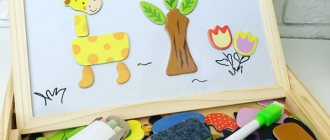All children in the world are united by a love of games.
Play is a natural need for a child, since it is in the form of play that children learn about the world, understand how it works, and consciously comprehend the experience gained.
Play is important not just as a source of joy and good mood, it develops the brain, imagination, creativity, vocabulary, social skills, the ability to learn and perceive more complex information.
How do 6-7 year old children develop?
At this age, the baby’s thinking abilities enter a new, better stage of development.
By age 6, most children:
- master reading, writing, counting to 20;
- understand the simplest time intervals;
- focus longer on one solution to one logical problem;
- their reasoning becomes more meaningful;
- understand information better by listening.
What games are useful at this age?
For a preschooler, different forms of games will be useful.
Psychologists recommend involving children in the following game formats:
- child-initiated play;
- play initiated by an adult;
- a traditional game when both a child and an adult can take the initiative.
From the point of view of benefits, the most significant games are those offered by adults, since in this case the child finds himself in a learning situation, gets acquainted with new words, concepts and can make this situation manageable.
As for choosing a specific game format, it all depends on the situation. For the street, outdoor games are selected that contain an element of sports. At home, you can play board games or role-playing games, or assemble a construction set.
1. Outdoor games develop coordination, strength, endurance, and reaction speed. At the age of 6-7 years, the game lasts about half an hour.
2. Board games help brighten up your leisure time when the weather is bad outside. With the help of cubes, puzzles, figures, cards, the child improves his skills - logic, spatial thinking, social interaction, speech, concentration, will.
There are a huge number of board games - walkers, puzzles, cubes, mosaics, construction sets, flashcards, strategies.
3. Educational games - in this case we are talking about the targeted development of a specific skill or ability, for example, speech, gross motor skills, intelligence, imagination.
The use of such games prepares fertile ground for the further development of the child’s creative abilities and talents. The training program is structured from simple to complex, but the conditions of each task should be slightly ahead of the child’s developmental level.
How to conduct classes at home
For many children, homework is much more fun than with a specialist. The child sees his mother or any other person he knows and feels safe. To get the most out of your lessons, you can purchase special guides that not only explain in detail how to set up and automate each sound, but also record the results. An example is N.V.’s speech therapy notebook. Sokolova.
Methods for correcting general speech underdevelopment in preschool children
For your information! Initially, speech therapy games should be accompanied by a voice explanation from an adult. After this, only the child should speak (or try to speak.
Speech therapy games for setting the sounds Ш and Ж
These sounds require a flattened position of the tongue, with the tip pressed against the upper palate. This can be achieved using the following exercises:
- "Shoulder". Stick out your wide tongue and place it on your lower lip.
- "Brush". Run the tip of your tongue from your teeth to your throat and vice versa.
- "Delicious jam." He licks his upper lip as if licking sweetness.
Speech therapy games for setting the sounds L and R
Both sounds require tension of the tip of the tongue against the roof of the mouth. However, the exercises for setting up sounds will be different.
Setting the “L” sound:
- "Punish your tongue." Extend and spread your tongue over your lower lip and lightly bite it with your upper teeth, making a “roo” sound.
- Alternating “spatula” and “back”. The tongue is spread over the lower lip or tense and is in the middle of the half-open mouth.
- "Horse". The purpose of this exercise is to teach the child to click by pressing the tongue against the alveoli behind the upper teeth.
Setting the "R" sound:
- "Car". Open your mouth wide, press your tongue against the upper tubercles and quickly say “ttt”, simulating automatic fire.
- "Brush your teeth". Run your tongue behind your upper teeth to the right and left.
- "Swing for children." Open your mouth and place the tip of your tongue directly on your upper lip, then on your lower lip.
Speech therapy games for setting the sounds Z, S and C
Normally, a child pronounces whistles correctly at 4 years of age. Exercises to help reproduce these sounds:
- Alternating a smile with the “Tube” exercise. Smile widely, hold this position for a few seconds, then purse your lips.
- "Pendulum". Open your mouth and point the tight tip of your tongue from the right to the left corner.
- "Slide". Place the tip of your tongue on your lower teeth and lift the middle palate above the upper palate, forming a cusp.
Important! When explaining the exercise, be sure to have a tabletop mirror with you, in which the child will see his reflection.
Each exercise must be repeated six times, the total execution time should not exceed 2-3 minutes. When trying to correct the situation, do not put a dirty hand in your baby’s mouth. If it is not possible to purchase special tools for a speech therapist (spatula), in case of forced contact with the child’s oral cavity, you can use a teaspoon, first sterilized in hot water.
Mirror in speech therapy games
Games 30. Plant
First of all, you need to make a plant - a tree, a flower - from any available materials. Then the child composes a fairy tale about him. The main thing is that in the story the child describes in detail how the plant feels - is it comfortable or is something bothering it.
Through these metaphors, an adult can understand what is bothering the child. If there is a cause for concern, ask your child what you can do to help the plant - build a fence, call a fairy, plant other trees. This way the baby will use the example of a fairy tale to cope with his anxieties.
Games 31. Face games
In children who have suffered some unpleasant events in life, a frozen mask may appear on their face and emotions disappear. You can motivate your child in several ways - invite him to play tricks, make funny faces with him, or organize a home theater.
Games 32. Simple holidays
Allow your baby to feel the holiday in your life as often as possible. Try to turn every simple event into something bright and unusual. For example, the festival of making the bed, washing, the festival of lunch. Be sure to record any of your child’s achievements, write them down or draw them - this motivates and builds confidence in yourself and your abilities.
Games 33. Color therapy
If your child often returns to unpleasant events in the past, focus his attention on the current day, for example, come up with a specific color for each day of the week and try to stick to it. For example, let Monday be blue - pick up such clothes, look for blue objects around.
Games 34. Schedule
To stabilize a child’s condition after a stressful situation, it is necessary to structure his daily routine, draw up a schedule, and decorate it. The kid must monitor its implementation. On the one hand, it teaches discipline, and on the other, it distracts from unpleasant thoughts.
Advice! Anxious children prone to stress intuitively choose outdoor games where they need to jump. This helps relieve tension and feel supported. Create an area for your child where he can jump safely and happily.
Conflict situations sometimes occur between children, and here play becomes critically important, since with its help the child relieves stress and relaxes . Of course, games should be appropriate for the child’s age and development, be diverse and useful. This is what we will talk about in our material.
Where to find time to play with your child
This question is asked by many parents, since modern moms and dads are busy people who have a lot of household responsibilities, work, of course, and a natural desire to take time for themselves and relax. Due to the fact that there is not enough time to spend with the baby, parents often worry and worry. Psychologists assure that you can find time to communicate with your child if you follow simple tips.
Tip 1 – play with your child and mind your own business at the same time.
Games that do not require special training or additional items can be played in the kitchen, bathroom, or on the street. If you don’t feel like playing, involve your child in homework, do something together, for example, make pizza, or just let your child help you.
The main thing is to talk to the child more, explain, praise and support.
Tip 2 – use any free minute.
Transport, queues, the road to somewhere - this time can be used profitably. Tell your child about natural phenomena, make riddles, compose fairy tales, play counting and words.
Tip 3 – games and activities should become a habit.
Of course, we are not talking about classes for an hour or two. Make it a rule to work with your child every day for 15-20 minutes; this will be quite enough for a child aged 6-7 years. For example, read a book to your child before bed.
Tip 4 – try to create a nurturing environment at home.
Use posters, manuals, cards, magnetic games. The more educational objects there are around a child, the faster he will remember information. Please note that developmental aids should be bright and colorful.
Tip 5 – find company for your child.
If this is the case and you cannot play with your baby, try to find children for him with whom he can spend his time.
Intelligence of a child aged 6-7 years
At this age, children have already formed personalities and have their own views on the world around them and what is happening in it. The child understands his position both in the children's team and among adults, and accordingly builds a line of behavior and forms a certain attitude towards the people who surround him.
The level of emotional development in children 6-7 years old is also quite high. They show sympathy , empathize, feel the mood of other people, and offer help.
- We are talking about children who are almost first graders, they can control their mood, follow the instructions and requests of adults, and take part in group and individual activities.
Advice! Since children 6-7 years old easily navigate circumstances, parents can give their child the basics of personal safety and teach them to find a way out of difficult situations.
2. At 6-7 years old, children show an active interest in new knowledge, since at this age the memory capacity increases, the child’s attention becomes more concentrated, and the vocabulary expands (up to 6 thousand words).
3. Parents need to continue classes on the development of children’s speech, familiarize children with the structure of language, in addition, develop fine motor skills, logic, and the ability to systematize objects by characteristics.
Goals and objectives in different periods of childhood
It was revealed that didactic games (DI) for preschoolers solve the following learning tasks:
- learning and understanding new knowledge;
- improving mental skills;
- application of knowledge in different situations;
- formation and progress of a child’s speech in a preschool educational institution.
DI can act:
- as an organizational and training form;
- methods of education and consolidation of knowledge;
- a means of educating morality and human will.
For your information! Play action is of particular importance; its purpose is to create a play situation and mutual relationships between playing children. If it is missing, it is no longer a game, but a conversation or a didactic exercise.








